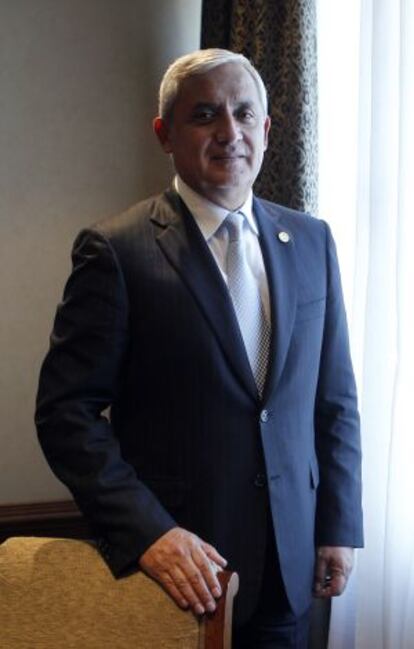"Central America doesn't get the help it needs in drug fight"
Guatemalan President Otto Pérez Molina supports investigations into human rights abuse


Guatemalan President Otto Pérez Molina knew from the beginning it was going to be an uphill struggle to win support from the international community to launch a global dialogue about the possible legalization and regulation of certain types of narcotics.
The day after he first announced this proposal in December 2011, Washington publicly shot down the initiative through the US Embassy in Guatemala City. Three months later, Honduras, El Salvador and Nicaragua rejected Pérez Molina's offer to organize a Central American summit to debate the issue.
"I believe that little by little I am winning more support, but there is still a lot to be done," said Pérez Molina, during a recent visit to Madrid. "I knew from the beginning that this wasn't going to blossom in six months or in a year. We either continue doing what we have done for the past 50 years or try out new things, and those new things should focus on the legalization of drugs."
According to Pérez Molina's proposal, the United Nations would reclassify narcotics based on their harmful effects, opening the door to legalization for some. The Central America region has one of the highest crime rates in the world due to the impact of drug trafficking. Yet it doesn't come up as a priority on the international community's security radar screen.
According to his proposal, the UN would reclassify narcotics based on their harmful effects
"Central America doesn't get the help it needs, and I don't think that it ever will," the president said. "Three years ago there was a meeting in Guatemala where commitments were reached for a so-called Strategy for Central American Security. But as of now, not even 10 percent [of promised aid] has been supplied."
Each Central American nation has to carry its own social burden, balancing the need to fund social programs with necessary resources to fight crime. Guatemala, which has been able to reduce crime by 23 percent with more money budgeted for law enforcement, has been particularly hard hit by the violent spillover of the Mexican drug-trafficking cartels' activities.
"With the pressure applied by [former Mexican President Felipe] Calderón, the cartels have moved south. For example, the Zetas didn't come to [Guatemala] to cooperate with the narco groups that were already in the country; they came to impose their control through bloody battles."
The Guatemalan army has been called out on to the streets to help enforce the law. But Pérez Molina - an ex-general who participated in the country's bloody Civil War, which took place from 1960 to 1996, and later helped draft the peace accords - denies that he is militarizing the nation. "We have not expanded the army's power, nor are we using the armed forces in the fight against the drug traffickers. What we have done is to ask them to help out in law enforcement.
"We have a 23,000-member police force for 14 million Guatemalans - that is 1.6 officers per 1,000 residents. International standards say there should be four officers per 1,000 residents in a country. We are going to hire 15,000 officers in the next four years," he said.
Unhealed wounds were recently reopened when Guatemala's former dictator Efraín Ríos Montt was ordered to stand trial this coming August on genocide and human rights charges in connection with the 1983 massacre of some 900 Mayan Ixiles, in Quiché department. A judge has ruled that the 83-year-old former general should be held responsible.
Pérez Molina, who was also an army general when the crimes occurred, said he supports investigations into past human rights abuses, even if it means reopening painful wounds. "I believe that this is all part of the reconciliation process, in this case for the Guatemalans. "There have always been abuses and violations; we hope that justice will be served fairly. This is a paradigm high-profile case over the last 20 years. It demonstrates that the country is ready to fight impunity."
Tu suscripción se está usando en otro dispositivo
¿Quieres añadir otro usuario a tu suscripción?
Si continúas leyendo en este dispositivo, no se podrá leer en el otro.
FlechaTu suscripción se está usando en otro dispositivo y solo puedes acceder a EL PAÍS desde un dispositivo a la vez.
Si quieres compartir tu cuenta, cambia tu suscripción a la modalidad Premium, así podrás añadir otro usuario. Cada uno accederá con su propia cuenta de email, lo que os permitirá personalizar vuestra experiencia en EL PAÍS.
En el caso de no saber quién está usando tu cuenta, te recomendamos cambiar tu contraseña aquí.
Si decides continuar compartiendo tu cuenta, este mensaje se mostrará en tu dispositivo y en el de la otra persona que está usando tu cuenta de forma indefinida, afectando a tu experiencia de lectura. Puedes consultar aquí los términos y condiciones de la suscripción digital.








































